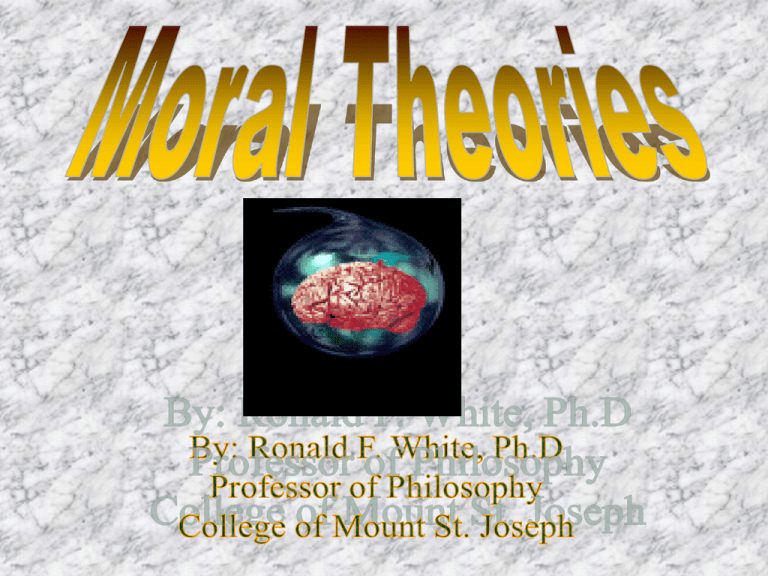
• Theories• Descriptive Inquiry
– Scientific Theories v. Metaphysical Theories
• Prescriptive Inquiry
– Normative Theories v. Metaethical Theories
• Cognitive Theories (moral judgments are
true or false)
– based on reason and/or experience
• Virtue-Based Theories
• Duty-Based Theories
• Consequentialist Theories
• Non-Cognitive Theories
• Intuitionism
• Emotivism
• Constructivism (Cultural Relativism)
• Teleological Moral Theories
• Deontological Moral Theories
• Virtue-Based Moral Theories
•
•
•
•
Goal Directed: A for the sake of B
Consequentialism
Cost/Benefit Ratios
Hedonism
– Pleasure=GOOD, Pain =BAD
– Hierarchy:
• Higher (intellectual: wisdom, beauty, friendship etc. )
• Lower (biological: sex, eating, drinking, etc.)
– Hedonistic Calculus
• Intensity, Duration, Probability, Fecundity,
•
Whose Pleasures and Pains Count?
– Egoism: self
– Altruism: others:
•
Problems:
– Objectivity of Pain and Pleasure
– Predictability of Pains and Pleasures
• (unanticipated consequences)
– Justice: social utility v. discrimination
• Divine Command Theory (Authority)
– Authorities: Leaders, Texts, Conscience.
– Universality v. Pluralism
• Rights-Based Theories (Justice)
– Libertarianism (Locke)
– Egalitarianism (Kant)
• Virtue Based Theories
MORALITY
:,
DUTY
Moral
Reasoning
Persons
(Ends)
Universal
Rules
(Categorical
Imperatives),
Universality
Ends v.
Means
Kingdom of
Ends
Right
Good Person
PLEASURE
Naturalistic
Dialectic
Property
(means)
Particular
Rules
(Hypothetical
Imperatives)
Good
Good Citizen
:,
INTEREST
•
•
Persons and Property
Rights–
–
–
Individual Rights
Group Rights
Right to Life
•
•
•
•
•
•
•
Non-Human Rights
Fetal Rights
Rights and Moral Principles: Utility, Beneficence, Non-Maleficence, Liberty,
Justice
Positive Rights and Negative Rights
Property Rights
Rights and DutiesRights and Sanctions–
–
–
Natural sanction- enforced by nature (natural/unnatural)
Moral sanction- enforced by community sentiment or convention (praise/blame)
Legal sanction- enforced by government (legal/illegal)
•
Contingent upon governmental knowledge and authority
–
•
Relationship between legality and morality
Conflict of Claims–
–
–
–
Individual v. individual
Group v. group (Israelis v. Palestinians, Men v. Women, Blacks v. Whites)
Group v. individual
Natural rights, Legal rights, Moral rights
• Architecture
– Praise (good acts) and Blame (bad acts)
• Teleological context: “forward looking”
– Change Behavior
» More pleasurable consequences (reinforce)
» Less painful consequences (deter)
• Deontological:” backward looking”
– Justice as Proportionality (retribution)
• Issues
– Free will (voluntariness)
– Determinism (causation or coercion)
•
•
•
•
•
Biological determinism
Social or cultural determinism
Moral Competence
Individualism v. collectivism
Is the assessment of responsibility empirical?
• Virtue: “The Excellence of a Thing.”
• Purpose:
• Human Excellence
– Intellectual Virtue:
– Moral Virtue (Habit)
• The Golden Mean”
– Vice of deficiency, Virtue, Vice of Excess.
• Moral Education
– Deliberation
– Vice
– Incontinence-(weakness of the will)
SPHERE OF
FEELINGS
VICE OF
DEFICIENCY
VIRTUE
VICE OF
EXCESS
Fear
Cowardice
Bravery
Foolhardiness
Pleasure/Pain
Insensibility
Temperance
(Moderation)
Self-Indulgent
Getting and
Spending
Cheapness or
Tightwad
Liberality
Prodigality
•
Non-Cognitivism
– Intuitionism
– Emotivism
– Constructivism
•
Emotivism
– Moral Statements are emotive expressions like expressions of taste
•
•
•
•
•
Killing is wrong because I disapprove of it
Killing is wrong because my culture disapproves of it
Good and Bad are not properties but expressions of individual or collective preference
Moral disagreements are conflicts of attitude not conflicts of belief.
Problems
– Universality
•
–
–
–
–
–
Are there universal moral sentiments?
Irreconcilability of moral disagreements
Nature of Moral Judgment
Reasons
Toleration
Confusion between Facts and Values
•
Does experiencing a moral feeling necessarily imply that it is good?
• Emotions are common among mammals,
especially primates (monkeys and apes)
• Foundational Moral Feelings
– Sympathy
• The Expanding Circle
• In-Group Out-Group Bias
– Consolation
– Retribution
• The Formal Principle of Justice









